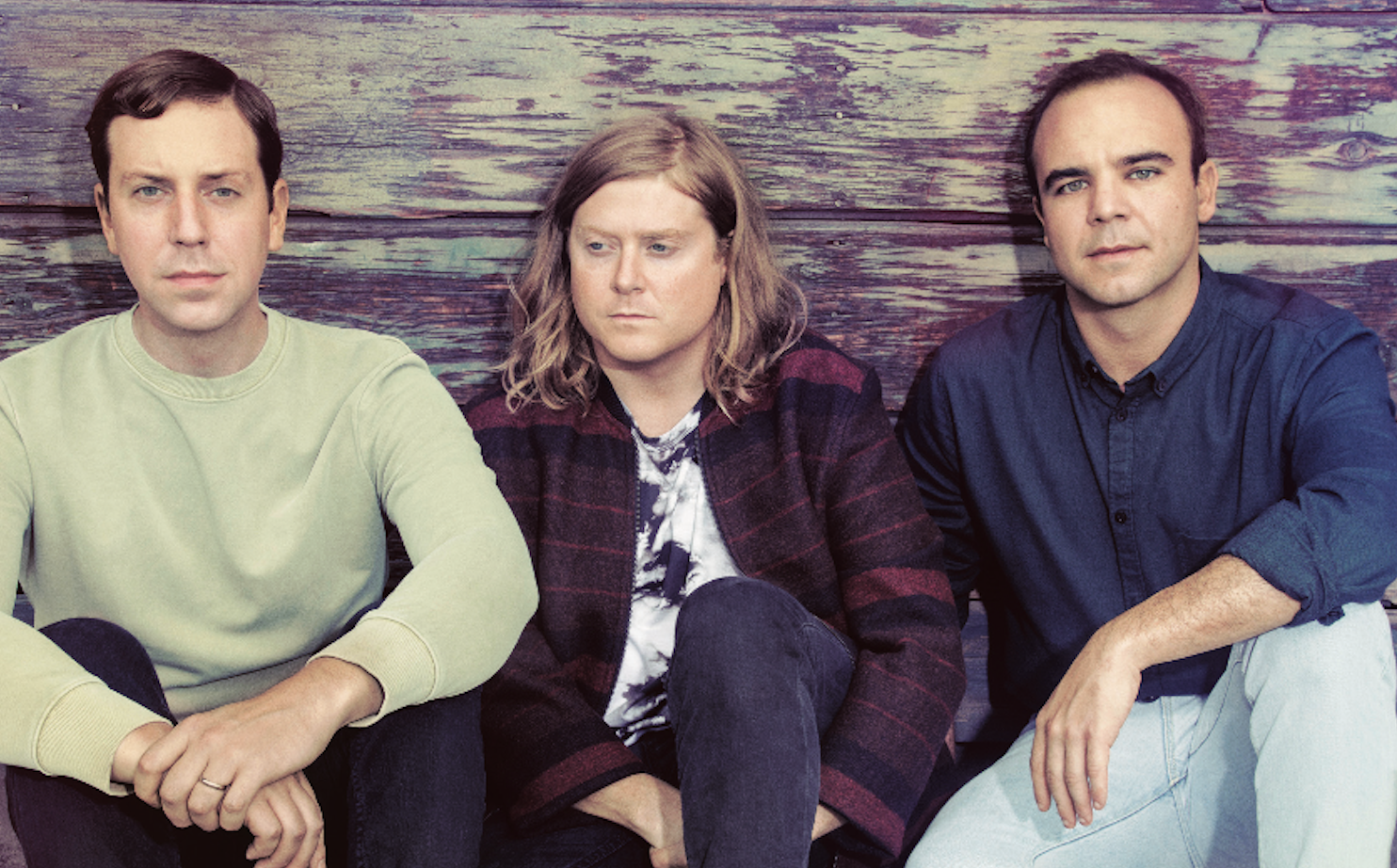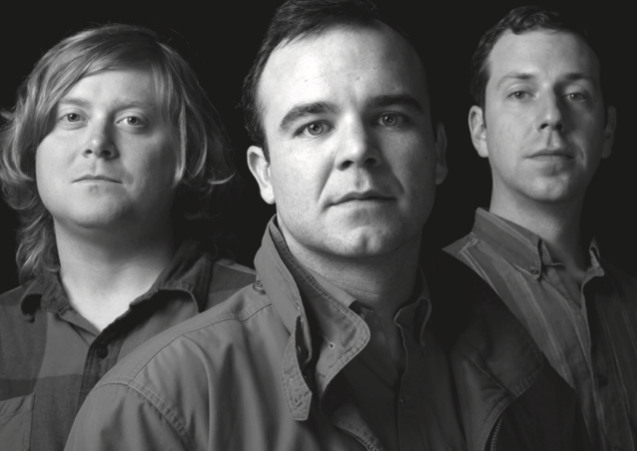Future Islands: _The Far Field_ of Dreams
 Tom Hines
Tom Hines
Samuel Herring vividly remembers the most crucial audience of Future Islands’ career. And no, it wasn’t the crowd at The Late Show, where the synth-pop trio inadvertently created a viral frenzy with their enigmatic performance of “Seasons (Waiting on You).” In an inconspicuous, pizza-slinging venue in Olympia, Wash.—one of roughly 300 dates on their expansive promotional tour for 2014’s Singles—the singer gazed stage-left and caught a glimpse of some unexpected fans. “In the front row, there was an 80-year- old woman in a wheelchair with her husband,” he says. “They were standing next to these three 15- or 16-year-old girls. Everybody just had the biggest smiles on their faces. Then, beside them, closer to the middle, was a middle-aged couple.
“To see that, it was like, ‘The truth of what we’re doing is coming though,’” Herring continues. “If we’re reaching across generationally, this is a good thing. It’s not a weird thing, like, h, no the grannies are coming to the shows. t s like, ‘If we’re reaching this woman with our music, this is great.’ I wish my grandmother could be here to see this. We just wanna reach people with our music— give something for people to dance to or cry to.”
“In 2015, getting off the road, I thought, ‘I’ve reached the goal I set out for myself at 23, which was to be a working musician who only had to worry about my art,” he continues. “If I wasn’t on the road, then I just had to create. That was my job. And reaching that goal was wonderful but, at the same time, it was time to reset. You need a new goal. You need something else to work toward to push yourself forward.”
Herring felt the stress of maintaining that momentum, which was exacerbated by the band’s draining, 22-month Singles trek. It’s a vicious cycle: With more people listening, they capitalized by booking every show they could, but that endless grind wore them down psychologically. Show after show, the group—Herring, bassist/guitarist William Cashion and keyboardist Gerrit Welmers—delivered their trademark live catharsis, best exemplified by that now classic Letterman performance.
In hindsight, that TV spot was destined to become a meme: With late-night hosts salivating for clickable content, Herring offered a perfect jaw-dropping vehicle for future laptop viewings. It was a tour-de-force of silliness and poignancy. Backed by his stoic bandmates, the frontman unleashed a stream of classic stage hits like the Chuck Berry duck walk, the chest pound, the Shakespearian hand gesture, the “sun in your eyes” squint and the electric slide—all while morphing his vocals from theatrical croon to death-metal bellow.
After wrapping the Singles tour in December 2015, Future Islands took a month off before regrouping in their home state of North Carolina at a beach house in the small town of Avon. There, during a weeklong writing retreat, they began their usual process: Cashion and Welmers jammed to a drum machine, as Herring scribbled lyric ideas in the corner. The process was productive at first: They wrote a song a day, including the propulsive “Ran,” the eventual lead single for their next LP, The Far Field. But the singer remained nervous, observing a breakdown in communication. “We thought, ‘Do we know how to do this still? Will we write another good song again?’’” Herring says. “We traveled all over the world in 2014 and 2015. And we were right beside each other the whole time, but you get to the point where you’re right next to each other and you’re best friends, but you’re not really communicating with each other.”
The trio continued to write over the spring and summer, inching closer to a full track list of new material. But they struggled to find a physical space conducive to creativity. Inconvenienced by the downtown construction plaguing Baltimore, they relocated to a cave-like practice room, with “no windows and black carpet on the walls for insulation.” Finally, they landed in Cashion’s studio space, a brighter environment with windows and bright lights. “I don’t know how much that affected what we were writing, but I’m certain it affected our mood in general,” Herring says. “I get a lot of credit for being an open and emotional lyricist and singer, but all of that comes from the music. The music is first. And the guys are very emotional writers in what they’re pulling from.”
Cashion and Welmers amassed enough grooves and soundscapes for multiple albums, but issues in Herring’s personal life—including the collapse of a long-distance relationship—became a distraction. Around May, the anxiety of finishing his lyrics threatened to derail their progress. “I got stressed out,” he says. “I had too many instrumentals, too many open songs where I hadn’t gotten to the end yet. was kind of worried about where we were at with the album. We only had about five or six songs that felt were album-worthy tracks. I had seven or eight instrumentals that were really good, and I’d started five of them with a first verse or a chorus. But I didn’t know where to turn. I was like, ‘Which song do work on at this time?’ I was kinda losing my mind with it. I’d freak out to the guys, like, ‘What the hell are we doing?’”
But Herring crossed a pivotal turning point during a road trip to visit his older brother in Asheville, N.C. During the eight-hour drive from Baltimore, zooming through the Blue Ridge Mountains, the singer cleared his head by perusing old instrumentals—and, suddenly, he flipped a mental switch, crafting the atmospheric words for ballad “Black Rose.” “By the time I got to Asheville the next day, had a finished demo,” he says. “In that time, it went from five or six good songs to eight or nine good songs. Then, the pressure went off.”
The band workshopped 15 new songs with renewed confidence during a trio of opening gigs in North Carolina. But to alleviate the tension, they performed under fake monikers: The Hidden Haven, named after an earlier beach rental; This Old House, a nod to the titular home improvement series, which Herring watched when he was growing up; and Chirping Bush, which was inspired by one of Welmers’ disturbing dreams. (“It was about a bunch of birds who couldn’t get out of a bush,” Herring says with a laugh. “The bush was chirping!”)
“We would just roll into town, show up and people would be like, ‘Hey, Future Islands—what are you doing here?’” Herring recalls. “In the old days, we would just write songs in between tours, take them on
After emailing a handful of potential producers, the band linked up with John Congleton at the famed Sunset Sound studios in Los Angeles. Together, encouraged by their new collaborator, they developed a routine: trekking a mile and a half to the studio every morning (“We looked ridiculous with our big book bags, like high school kids walking to school”), recording, eating lunch, going home by 6 p.m., then unwinding without musical decisions to distract them.
Even though Singles transformed Future Islands’ career, Herring feels that the is “much more clinical than [the band’s] early records” and that both the album’s production and their performances lack a distinctive warmth. With Congleton, Herring hoped they could recapture the “rawness and messiness” of albums like 2010’s In Evening Air and the following year’s On the Water.
“Singles was also our first time in the studio and being high-fidelity,” he says. “This was the first time we weren’t recording an album in the living room of a house. But because of those living room environments and learning on the fly, there are certain beauties about the early records that missed. Something John said that stuck with me was: ‘Producers and musicians want things to be so perfect that they take all the magic out of their records. They’ll make everything the way it’s supposed to be, and the music completely loses its’s spirit.’ I completely agree with that. I trusted John with our weird ideas.”

While less polished than their previous album, The Far Field is similarly focused: exploding with pop choruses (“Ran,” “Time on Her Side”) and defined by the interplay of Welmers’ sleek synth pads and Cashion’s throbbing, Peter Hook-styled bass. And while Herring often writes in romantic analogies (shifting seasons, glowing moons, shining suns), his new words speak plain, soul-baring truths about physical and emotional distance. The album’s centerpiece is “North Star,” a tropical-tinged anthem about a brutal snowstorm that nearly—just nearly—keeps the singer from visiting his then-girlfriend.
He also expands his vocal repertoire at every turn: dialing back the scratchiness to reveal a more tender tone, layering thick harmonies. (He developed the latter technique after experimenting on a holiday cover of Wham!’s “Last Christmas.” Herring’s voice has always been the band’s most dynamic and divisive instrument—but here, it protects an unexpected confidence and clarity.
“I try not to call myself a singer so nobody can call me out for it: ‘You’re a terrible singer!’” he says. “I still feel strongest as a writer and performer. Really, Singles taught me a lot about my voice. For some of the problems I have with that album, there’s a lot of stuff I couldn’t have written without [producer] Chris Coady’s touch. My vocals are so clear, and that made me appreciate my voice for the first time in a long time. It made me think, ‘Oh, I can sing!’
“Between Singles and The Far Field, there were more than 300 shows,” he continues. “That really takes a toll on the voice. Going into this album, I was fearful, wondering if could still do the things used to do. You quickly learn to turn any disadvantage into an opportunity to explore your voice more. Really, I’m a singer because I have to be. Maybe when I’m, like, 70, I’ll call myself a singer.”
Herring may not consider himself a pure vocalist, but that’s just modesty talking. He’s one of modern pop’ s most commanding presences : Hearing and watching him perform, it’s impossible not to feel something, whether you’re weeping, laughing or simply staring with your jaw on the floor. With The Far Field, Future Islands prove that their breakout magic wasn’t a fluke. They’ve touched a nerve.
“We felt successful before Letterman and Singles and all that—that just pushed it further,” Herring says. “It never felt like we pulled the wool over somebody’s eyes. Because we put in the work—we’re all from hard-working Southern families. If I’m gonna make a dollar, then I’d rather sweat for it than sit down. That’s what we do. It feels good that we’ve earned something together.”




















